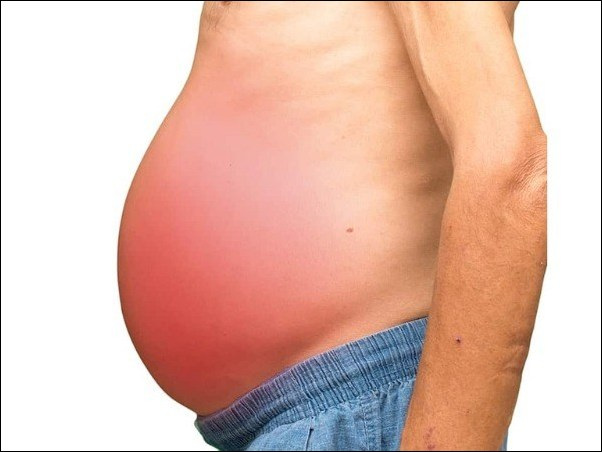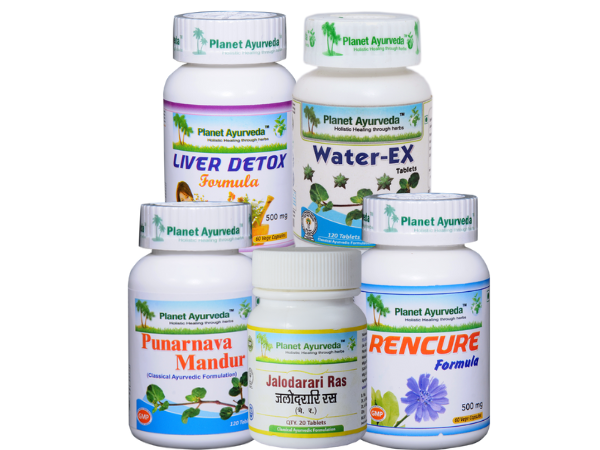Ascites and Its Treatment – Diet and Herbal Remedies
ABSTRACT
Ascites is an abdominal fluid-related pathological condition caused by portal hypertension (increased blood pressure in certain arteries in the liver and low albumin protein in the blood). the protein produced by the liver). Bacteria that can cause serious liver damage can cause ascites. This article explains the types, causes, symptoms, problems, diagnoses, and Ayurvedic overview of ascites and herbal remedies. There is no specific medicine in modern science, but Ayurveda may give the best results for ascites treatment. In this article, we will discuss ascites treatment according to Ayurveda.
INTRODUCTION
As mentioned above, ascites is a condition in which fluid accumulates in the cavity (the abdominal region that includes the liver, intestines, and liver). In severe cases, it can cause pain. There is more than 25 ml of fluid in the peritoneal cavity. In this case, the fluid may enter the chest and surround the lungs, and breathing problems may occur. Ascites can affect your lungs, kidneys, and other organs. We may be interested in "JALODAR", a Type of Udara Roga in Ayurveda.

TYPES OF ASCITES
Body fluids are divided into two types based on their protein content
1. Transudate Ascites
This occurs when the patient’s overall serum ascites albumin gradient (SAAG) level is greater than 1.1 g. Transudate contains fewer cellular components (such as cells, proteins, substances, and dehydrogenases). It has a lower specific gravity. This process is passive and transparent. Widely used in portal hypertension, heart failure, etc.
2. Exudate Ascites
This condition occurs when the patient’s serum ascites albumin gradient (SAAG) is less than 1.1 g/dL. The exudate contains many cells such as polymorphs or lymphocytes. It has a high specific gravity. The process is active, and the liquid is clear or cloudy. It is found in peritoneal diseases such as tuberculosis and tumours.
CAUSES OF ASCITES
Liver cirrhosis is the most common cause of ascites. Cirrhosis is caused by the most common cause: excessive alcohol consumption. Ascites can be caused by many other problems.
- Congestive Heart Failure
- Kidney Failure
- Infection.
SYMPTOMS OF ASCITES
Ascites with the following symptoms
- Weight gain.
- A feeling of heaviness.
- Nausea.
- Vomiting.
- Swelling in the abdomen.
- Difficulty breathing.
- Swelling in the lower legs.
COMPLICATIONS
There are the following complications associated with ascites:
- Abdominal wall hernias
- Pleural effusion
- Bloody ascites
- Spontaneous bacterial peritonitis
DIAGNOSIS
This includes a physical exam and different tests performed and suggested by your doctor. Your doctor might arrange the accompanying tests
- Ultrasound of your abdomen to check your liver and abdominal fluid.
- A chest X-ray can show diaphragmatic pressure.
- CT scan: This will check for lumps.
Further testing should only be done if a particular diagnosis is suspected.
- Blood tests: CBC, SGOT, SGPT, protein, albumin
(A Blood test helps check the fluid level.)
- A urine test is done—sugar, sodium level, etc.
In mild ascites, it’s hard to diagnose or notice the disease externally. The fluid, when present, can only be detected by ultrasound. In Moderate ascites, it may be noticed by examining the abdominal structure externally. When the patient turns on the other side and then notes the flanks, they will shift at that time. In severe or massive ascites, the patient complains of stiffness of the abdomen, a feeling of pressure, abdominal heaviness, and Shortness of breath. When a patient’s abdomen is pressed slightly on one side, it will generate a wave through the fluid that is noticed on the other side. Padashotha (Edema of the feet) is also seen in cases of severe ascites.
TREATMENT
- Diuretics
- Anti-inflammatory drugs
AYURVEDIC OVERVIEW OF ASCITES
Ascites are associated with Jalodar in Ayurveda. It is a type of Udara roga (disease of the abdomen). In Ayurveda, there are eight types of udara rogas mentioned in the Samhitas. Ascites is the final stage of each udara roga. It is a chronic condition. Jalodar is not a sign or symptom of any disease; ascites is a disease in itself. This is a Tridoshaj vyadhi.
WHAT IS JALODARA?
रूद्ध्व स्वेद अम्बु वाहिनी दोषा: स्रोतांसि संचिता।
प्राण अग्नि अपानान संदूषय जनयन्ति उदरं नृणाम।। (Ch. Chi. 13)
Accumulation of aggravated vata in between skin and muscle tissue in the udara leads to swelling in udara Pradesh, which is termed as Jalodara.
NIDANA (CAUSE)
It results from
- High blood pressure in certain veins and a deficiency of albumin protein.
- Clotting of blood in the veins of the liver
- Pancreatitis.
- Swelling in the outer layer of the heart.
- Kidney dialysis.
- Alcohol consumption for a long time.
SAMPRAPATI (PATHOPHYSIOLOGY) OF JALODARA
स्नेहपीतस्य मन्दाग्नेः क्षीणस्यातिकृशस्य वा।
अत्यम्बुपानांन्नुष्ठेअग्नौ मारुत: क्लोमिन संस्थित:।।
स्रोत:सु रुद्धमार्गेषु कफश्चोदकमुर्षित:।
वर्धेयतां तदेवाम्बु स्वस्थानादुदराय तौ ।।
After snehapana (oleation therapy), when people with low digestive fire frail drink too much water, the agni (digestive fire) disappears and the kloma nalika (the vessel) is filled with air (pertaining to the pancreas). The passage of the source is blocked and the fluid in the stomach increases, causing ascites.
POORAV ROOP (PRELIMINARY SIGNS OF DISEASE)
- Shoth in feet (swelling)
- Kshudha naash (no hunger)
- Udavarta (vata reverse movement)
- Shvash Kashat (difficulty breathing)
- Aadhman (bloating)
LAKSHANAS (Signs and symptoms)
- Kasaa (cough)
- Shool (stomach ache)
- Hrida Spandan (palpitations)
- Udara Utsedha (flatulence)
- Samparivrita Nabhi (Everted umbilicus)
- Aruchi (anorexia)
- Dorbalya (Weakness)
Updrava (Complications)
- Vaman (vomiting)
- Hikka (hiccough)
- Mutraghata (urinary retention)
- Kaas (cough)
- Trishna (excessive thirst)
HERBAL REMEDIES FOR ASCITES BY PLANET AYURVEDA
Planet Ayurveda has the best combination of excellent medicines, like the Liver Care Pack. This medicine is made from 100% natural herbs without the use of chemicals, colours, preservatives, or additives. This remedy has been prepared under the supervision of Ayurvedic experts.
- PUNARNAVA CAPSULES
- WATER-EX TABLETS
- RENCURE FORMULA
- LIVER DETOX CAPSULES
- JALODARARI RASA


PRODUCT DESCRIPTION
1. PUNARNAVA CAPSULES
Punarnava capsule is a single herbal capsule. These capsules consist of the herb Punarnava (Boerhavia diffusa). Punarnava is effective in reducing fluid and ascites symptoms in the stomach. It balances the Vata and Kapha dosha. Punarnava has anti-inflammatory action.
Dosage: 2 capsules two times a day.
2. WATER-EX TABLETS
Water-Ex tablets are polyherbal tablets. It consists of the root extract of Punarnava (Boerhavia diffusa), bark extract of Varuna (Crataeva nurvala), fruit extract of Gokshura (Tribulus terrestris), and excipients. Gokshura possesses diuretic properties and is also helpful in obesity, headaches or stress. Varuna is helpful in reducing deep-seated suppurative inflammation.
Dosage: 2 tablets three times a day.
3. RENCURE FORMULA
Rencure formula is a polyherbal herbal capsule. This formulation is prepared using Punarnava (Boerhavia diffusa), Varun (Crataeva nurvala), Gokshur (Tribulus terrestris), Palaash (Butea monosperma), and Kasni (Cichorium intybus). Palaash has anti-inflammatory and diuretic action.
Dosage: 1 capsule two times a day.
4. LIVER DETOX FORMULA
Liver Detox Formula is a polyherbal capsule. It consists of Katuki (Picrorhiza kurroa), Kalmegh (Andrographis paniculata), Haritaki (Terminalia chebula), Makoy (Solanum nigrum), etc. It detoxifies the liver and improves blood flow from the liver. It helps stimulate new liver cells. Katuki clears Kapha and Pitta and promotes liver function and health. Kalmegh is used to treat hemolytic jaundice and other liver conditions. Haritaki regulates bowel movements, helps in virechana, and expels malas out of the body. Makoy is used as an analgesic.
Dosage: 2 capsules two times a day.
5. JALODARARI RASA
Jalodarari Rasa is a polyherbal tablet. It consists of Pippali (Piper longum), Maricha (Piper nigrum), Tamra Bhasma (Copper ash), Jaiphala (Croton tiglium), Snuhi Ksheera (), and Rajani/Haridra (Curcuma longa). It acts as a virechana dravya so it helps move out the fluid. Jalodrari Rasa also supports Liver health. It is also helpful in indigestion and discomfort.
Dosage: 1 tablet two times a day.
Diet Recommendation
- Early morning: half a tablespoon of barley seed is soaked overnight in one glass of water and drunk in the morning.
- Breakfast: Dalia (wheat porridge), Vermicelli, veg oats, egg white portion only, Chapati with dal.
- Lunch: wheat roti without oil, boiled vegetables.
- Dinner: plain chapati with dal, boiled rice, khichdi, and Dalia
Avoid
Avoid tangy fruits like tomatoes, Mango, and oranges because they cause coughing and breathing difficulty. Avoid fast food. Avoid Alcohol, Potatoes, excess use of salt, etc.
Conclusion
Ascites are a condition of fluid accumulation in the stomach. Ascites cause abdominal pain, nausea, vomiting, swelling, etc. JALODAR is defined in Ayurveda as a type of udara roga. Planet Ayurveda offers herbal combinations for ascites treatment, such as the Liver Care Pack, which includes Indian Echinacea, Yakrit Plihantak Churna, Phyllanthus niruri, and Liver Detox Formula. To get the best results, you should follow the diet plan and not skip the medication.
Dr. Vikram Chauhan
Latest posts by Dr. Vikram Chauhan (see all)
- How To Manage Advanced Stage of Ulcerative Colitis With Ayurveda? - November 9, 2024
- How The Liver Is Connected With Metabolism, Digestion, And Weight Management - October 23, 2024
- Chemotherapy And Ayurvedic Treatment For Cancer - October 18, 2024
- Natural Ayurvedic Treatment For Psoriasis With Herbal Remedies - October 7, 2024
- How Ayurvedic Treatment For Liver Failure Is More Effective Than Modern Treatment? - September 12, 2024




